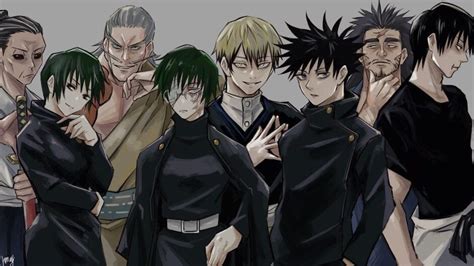
Toji Zenin’s story is marked by his dramatic rejection by the Zenin Clan, which significantly impacted his life and character. Once a prominent member of the Zenin Clan, Toji’s path diverged from that of his family, leading to his eventual estrangement. His rejection was driven by complex clan dynamics and personal differences, which highlighted broader themes of familial expectations and individual autonomy. Toji’s journey reflects the broader struggles of balancing personal identity with the demands and traditions of a powerful family lineage.
Clan Dynamics and Expectations
The Zenin Clan, one of the most influential families in the world of Jujutsu Kaisen, has strict expectations for its members, emphasizing tradition, power, and loyalty. Toji Zenin’s rejection was influenced by these stringent clan dynamics, which demanded conformity and adherence to established norms. Toji’s unorthodox approach and personal ambitions clashed with the clan’s rigid structure, leading to tensions and ultimately his expulsion. Understanding the Zenin Clan’s expectations helps explain the conflict between Toji and his family.
Toji Zenin’s Background
Toji Zenin’s background provides crucial context for his rejection by the Zenin Clan. Born into a prestigious family with a legacy of powerful sorcerers, Toji was initially seen as a promising member of the clan. However, his personal choices and departure from traditional practices set him apart from his peers. Toji’s background, including his training and early achievements, shaped his identity and influenced his eventual divergence from the clan’s path. This divergence highlights the conflict between individual aspirations and familial expectations.
The Turning Point
The turning point in Toji Zenin’s relationship with the Zenin Clan came when his actions and decisions increasingly diverged from the clan’s ideals. His rejection was precipitated by significant events or decisions that challenged the clan’s authority or norms. Whether it was a radical change in his approach to sorcery or defiance against the clan’s leadership, these pivotal moments crystallized his separation from the Zenin Clan. Analyzing these events provides insight into the factors that led to his estrangement.
Personal Ambitions vs. Clan Loyalty
Toji Zenin’s personal ambitions often conflicted with his loyalty to the Zenin Clan, contributing to his eventual rejection. His desire to forge his own path and pursue unconventional methods of sorcery put him at odds with the clan’s values and expectations. The tension between personal goals and clan loyalty is a central theme in Toji’s story, illustrating the challenges faced by individuals who seek to break away from established traditions. This conflict underscores the broader theme of balancing personal identity with familial obligations.
Impact on Toji’s Character
The Zenin Clan’s rejection had a profound impact on Toji Zenin’s character and life choices. Estrangement from his family led to a shift in his personal and professional trajectory, influencing his development as a sorcerer and an individual. The rejection and subsequent events shaped Toji’s outlook, relationships, and actions. Examining how this rejection influenced his character provides a deeper understanding of his motivations and behavior throughout the series.
Relationship with Other Characters
Toji Zenin’s rejection by the Zenin Clan affected his relationships with other characters in the series. His estrangement influenced how he interacted with allies, adversaries, and members of the Zenin Clan, including his son, Megumi. The dynamics of these relationships, shaped by his rejection and subsequent actions, are crucial for understanding his role in the story. Exploring these interactions reveals how Toji’s rejection impacted his connections and influenced the narrative.
Legacy and Influence
Despite his rejection by the Zenin Clan, Toji Zenin left a significant legacy and impact on the Jujutsu Kaisen universe. His unique approach to sorcery and his role as a powerful sorcerer contributed to his enduring influence. The legacy he left behind, including his impact on his son and his role in key events, highlights the complexities of his character and the lasting effects of his estrangement. Assessing Toji’s legacy provides insight into his significance within the broader context of the series.
The Zenin Clan’s Perspective
The Zenin Clan’s perspective on Toji Zenin’s rejection reveals the clan’s values and reasoning behind their decisions. The clan’s leadership and members likely viewed Toji’s actions as a threat to their authority or as a deviation from their traditions. Understanding the clan’s viewpoint helps contextualize the reasons for Toji’s rejection and the broader implications for the clan’s dynamics. This perspective sheds light on the internal conflicts and challenges faced by the Zenin Clan.
Reconciliation and Resolution
The theme of reconciliation and resolution is relevant in the context of Toji Zenin’s story. While Toji’s rejection by the Zenin Clan was definitive, the potential for reconciliation or resolution is a key aspect of his narrative. Exploring whether Toji sought to reconcile with his family or how his story concluded provides insight into the resolution of his character arc. This aspect of his story addresses the themes of redemption, forgiveness, and the possibility of mending fractured relationships.
Broader Themes of Familial Expectations
Toji Zenin’s rejection highlights broader themes of familial expectations and individual autonomy. His story reflects the struggles faced by individuals who challenge traditional family roles and expectations. The tension between personal freedom and family obligations is a recurring theme in literature and real life, and Toji’s experience serves as a powerful example. Analyzing these broader themes provides a deeper understanding of the conflicts and resolutions within the narrative.
Toji Zenin’s rejection by the Zenin Clan is a pivotal element in his character development and the broader narrative. His story reflects the complex interplay between personal ambitions, familial expectations, and individual identity. By examining the historical context, personal conflicts, and impacts on relationships, a comprehensive understanding of Toji’s rejection and its significance emerges. His legacy and the clan’s perspective further illuminate the themes of family, identity, and reconciliation within the series.